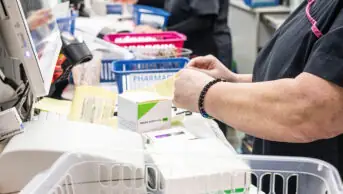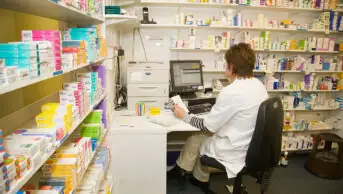
The Pharmaceutical Journal/Shutterstock.com
Efforts to increase research capacity and capability within our profession continue at pace, illustrated in February 2024 by the publication of ‘Report on a UK survey of pharmacy professionals’ involvement in research’, the inception of the National Institute for Health and Care Research (NIHR)-funded pharmacy incubator and the new NIHR undergraduate internship programme. The latter offers pharmacy undergraduates an opportunity to get involved in research, while giving early to mid-career researchers the chance to develop a competitive application and refine their supervisory skills. As a collaboration between pharmacy professionals working in multiple sectors intent on growing research capabilities at a grassroots level, we were successful in winning two NIHR internship awards. Coupled with awards won from two other schemes, we collectively supervised six undergraduates and two sixth-form students to undertake research activities (see Table).
Our aim was to increase research awareness and clinical academic potential among the future pharmacy workforce, support valuable project work, showcase diverse research opportunities and build transferable research skills for both students and supervisors.
We worked across sectors to devise a varied internship programme with placements lasting between two and ten weeks in summer 2024. The placements comprised research and experiential activities, such as learning about the practical aspects of conducting research from hospital clinical trials and research teams; exploring how clinical practice can be examined and improved through a research lens; and visiting research facilities and speaking to researchers (see Box 1).
Box 1: Experiential activities
- Shadowing and interviewing clinical research teams and healthcare professionals, observing and understanding their work, the impact it has and the challenges they face;
- Observing trial patient consent processes and data collection;
- Networking with PhD pharmacists at universities to gain insights into advanced research methodologies;
- Discussing and observing how research activities fit into clinical pharmacy roles with practice-based advanced and consultant pharmacists;
- Attending a research conference;
- Reconciling the complex needs of a specific group of patients, the perspectives of essential stakeholders and the academic literature to evaluate and make an executive decision on the correct outcome measure to use.
During the placements, we set up regular team meetings for coordination and task allocation. Additionally, research tasks were strategically chosen for each intern, based on an analysis of their development needs, and we collected perspectives about their experiences in a self-written report upon the completion of the internship.
Through varied activities, the students had the opportunity to diversify their skills and develop tools that will help them advance in their future careers. For example, interns learned how to conduct literature reviews and perform critical appraisals. They also learned about data analysis and how to prepare conference posters (see Box 2).
The internships were an eye-opener to the variety of research activities undertaken by pharmacy professionals. For the supervisory team, the experience was rich in learning about the value of investing early in our future workforce and provided opportunities to progress projects that have been set back owing to clinical commitments.
Box 2: Key skills
Research
- Literature review and critical appraisal;
- Observing and engaging in study consent processes;
- Reviewing study documents;
- Conducting semi-structured patient and healthcare professional interviews;
- Data collection, cleansing and management activities in both clinical practice and academia;
- Data analysis (quantitative and qualitative);
- Preparation of reports and updates for central research teams and local stakeholders;
- Preparation of conference posters.
Transferable
- Time management;
- Project management;
- Effective communication with team members and supervisors.
Lessons learned
These internships have provided students with an appreciation of pharmacy research beyond standard practice by:
- Highlighting the collaborative nature of healthcare within trusts, where different sectors and skills come together to provide optimal patient care;
- Allowing them to learn from their experiences and guiding them in planning their own career path through engagement with respected healthcare professionals;
- Giving them confidence in their abilities and a clearer vision of their future in both clinical practice and research.
In their feedback, students told us that the placements “deepened [their] appreciation of pharmacy beyond just prescribing and drugs” and that the placements “gave [them] the opportunity to develop data and time management”.
Another student said: “Being surrounded by experienced healthcare professionals during this internship has been invaluable.”
Supervising pharmacists benefitted from the additional support to progress their projects alongside their clinical academic roles and we noted that longer internships provided more research activity opportunities. As early to mid-career researchers, we highly valued the experience, progressed our research and further developed our supervisory skills. Additionally, it has strengthened our working relationship and encouraged us to think about bigger opportunities, such as an NIHR health and social care delivery research programme. We recommend this opportunity to other early to mid-career researchers, noting that the NIHR undergraduate internship programme opens for bids annually each autumn.
Disclosure
This project is funded by the National Institute for Health and Care Research (NIHR) Undergraduate Internship Programme (NIHR 304422 and NIHR 304429).
The views expressed are those of the author(s) and not necessarily those of the NIHR or the Department of Health and Social Care.


